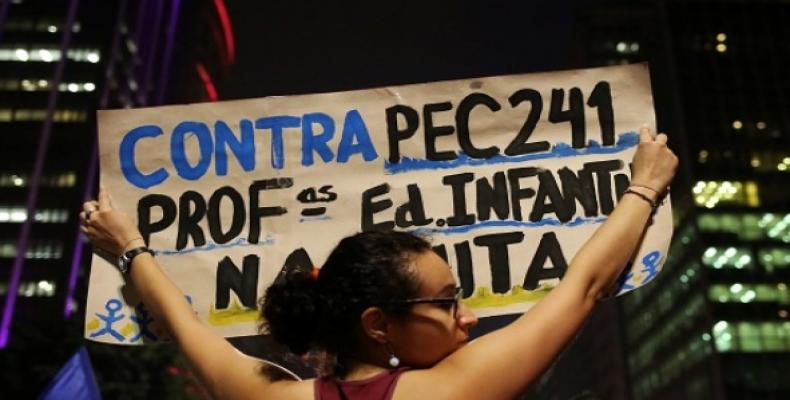Brasilia, November 2 (RHC)-- Brazil’s finance minister has claimed that the expansion of government-funded social programs sparked the country’s economic woes, insisting that a controversial 20-year freeze on public spending and raising the minimum retirement age are critical reforms to pull the South American nation out of its economic slump.
In an interview with the Brazilian newspaper Folha de Sao Paulo, Finance Minister Henrique Meirelles claimed that there is “great confidence” and “optimism” from investors in the plans pushed by the installed administration of President Michel Temer to slash public spending and boost foreign investment, adding that the primary investor concern is in seeing “full implementation of the fiscal adjustment.”
Key in this economic doctrine for austerity is a proposal to freeze public spending to inflation for the next 20 years, a move critics argue will only deepen Brazil's economic crisis, and adversely impact public healthcare, education and anti-corruption investigations, among other initiatives.
The contentious Proposed Constitutional Amendment, known by its Portuguese acronym PEC 241, has already received the green light in the lower house of Congress and must now pass through the Senate. Meirelles told Folha that he expects the Senate to pass the reform with ease before the end of the year, adding that it would be “suicide” to review the spending cap after three years and advocating locking it in for at least 10 years.
Progressive economists maintain that austerity is the opposite of what Brazil’s cash-strapped economy needs, arguing instead that a neo-liberal rollback would worsen inequality and deprive the domestic market of much-needed buying power.
But Meirelles, who entered office as part of Temer’s cabinet following the impeachment of former President Dilma Rousseff — widely condemned as a parliamentary coup — claimed that the expansion of social programs under the progressive Workers’ Party governments of Rousseff and her predecessor and mentor Luiz Inacio “Lula” da Silva was to blame for Brazil’s recession.
Meanwhile, other controversial moves of the Temer administration include a move toward mass privatization of resources, including rich offshore “pre-salt” oil reserves, and a bid to open up farmland to foreign corporations.
Meirelles also added that scaling back social security and raising the new minimum retirement age to 65 are central reforms to the Temer government's promises to reinvigorate the ailing economy. He claimed that there is no way to maintain social security financing without retirement reform, warning of a tax hike. “It would mean a tax increase because the bill would have to be paid,” he told Folha.
The finance minister, who previously served as president of the Central Bank during the government of former President Lula, declined to indicate whether he would run in the 2018 presidential elections. “I’m a candidate to do a good job at the Ministry of Finance and to make the economy grow,” he said, adding that he thought the mood for the 2018 election is “hard to predict.”
Polls in recent months have signaled that Lula would be the favored candidate on the 2018 presidential ballot. Temer, on the other hand, would be unelectable even if not for his low approval ratings, as he is barred from running for office for eight years over charges that he violated election financing rules — a fact that did not stop him from being installed as president upon Rousseff’s ouster.
Brazil Finance Minister Blames Crisis on Public Spending, Touts Austerity


